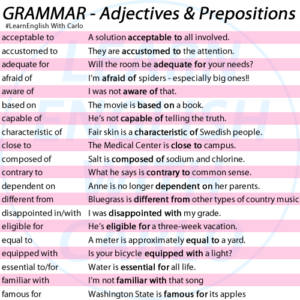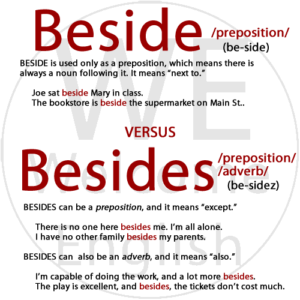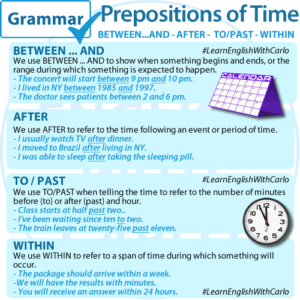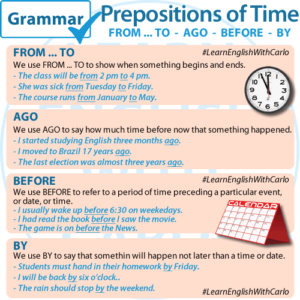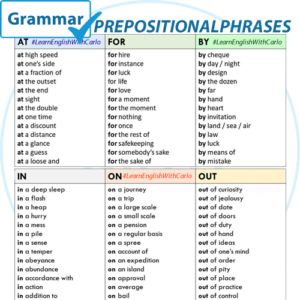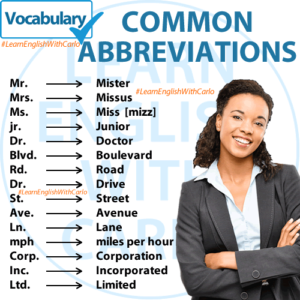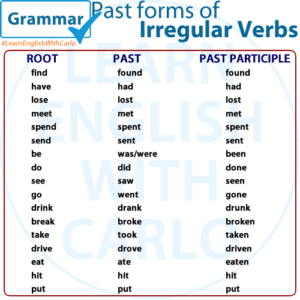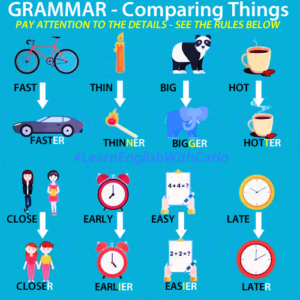People always ask me what things they can do during their everyday lives that might help them improve their English. Here are a few suggestions. If you can think of any others, please add them in the comments.
Category: INSTAGRAM
Images I've posted to Instagram
Permanent link to this article: https://englishyourway.com.br/improve-your-english/
Dec 12
GRAMMAR – Adjective + Preposition
Adjectives are words used to describe a person, place, or thing.For example: The tall man in the red shirt is a friend of mine. We drove along a quiet road until we reached a small town. I’m reading an interesting book. Prepositions are words used to connect two ideas or to demonstrate the relationship between …
Permanent link to this article: https://englishyourway.com.br/grammar-adjective-preposition/
Dec 12
VOCABULARY – Beside/Besides
Permanent link to this article: https://englishyourway.com.br/vocabulary-beside-besides/
Dec 12
GRAMMAR – Prepositions of Time
BETWEEN…AND – AFTER – TO/PAST – WITHIN We use BETWEEN … AND to show when something begins and ends, or the range during which something is expected to happen.– The concert will start between 9 pm and 10 pm.– I lived in NY between 1985 and 1997.– The doctor sees patients between 2 and 6 …
Permanent link to this article: https://englishyourway.com.br/grammar-prepositions-of-time-2/
Dec 12
GRAMMAR – Prepositions of Time
FROM … TO – AGO – BEFORE – BY We use FROM … TO to show when something begins and ends.– The class will be from 2 pm to 4 pm.– She was sick from Tuesday to Friday.– The course runs from January to May. We use AGO to say how much time before now …
Permanent link to this article: https://englishyourway.com.br/grammar-prepositions-of-time/
Dec 04
GRAMMAR – Confusing Words
WHILE and DURING WHILE is a CONJUNCTION that is used to refer to a background period of time in which another activity happened. It is very similar to during, but it is followed by a sentence (while + subject + verb…), so they are not interchangeable. DURING is a PREPOSITION that is used before an …
Permanent link to this article: https://englishyourway.com.br/grammar-confusing-words/
Permanent link to this article: https://englishyourway.com.br/grammar-prepositional-phrases/
Nov 28
VOCABULARY – Common Abbreviations
An abbreviation is a shortened form of a word or phrase. Here are some of the more common ones: Mr. – MisterMrs. – MissusMs. – Miss [mizz]jr. – JuniorDr. – DoctorBlvd. – BoulevardRd. – RoadDr. – DriveSt. – StreetAve. – AvenueLn. – Lanemph – miles per hourCorp. – CorporationInc. – IncorporatedLtd. – Limited
Permanent link to this article: https://englishyourway.com.br/vocabulary-common-abbreviations/
Nov 28
GRAMMAR – Past forms of Irregular Verbs
The difference between a regular and an irregular verb is the formation of the simple past and past participle. Regular verbs are consistent—the simple past ends in ed as does the past participle. BUT, the simple past and past participle of irregular verbs can end in a variety of ways, with no consistent pattern. Here …
Permanent link to this article: https://englishyourway.com.br/past-forms-of-irregular-verbs/
Nov 09
GRAMMAR – Comparing Things
To compare two things, we use what is called a COMPARATIVE ADJECTIVE to what is different between the two things. We do this by modifying the adjective of the characteristic that is different. Here are the rules for this:For adjectives of one syllable:You add ‘ER’Examples:smart – smartERyoung – youngERfast – fastER For adjectives of one …
Permanent link to this article: https://englishyourway.com.br/grammar-comparing-things/


